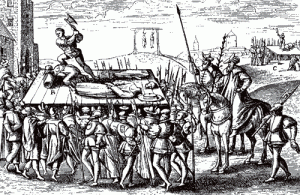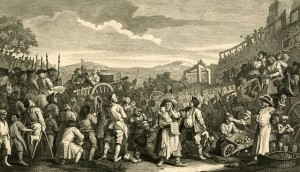High Treason
“…Benjamin Merrill, be carried to the place from whence you came, that you be drawn from thence to the place of execution, where you are to be hanged by the neck; that you be cut down while you are yet alive…”
Without dispute, the greatest news story of 1771 in the American Colonies would have to be the chronicle of the North Carolina “Regulators.” Nothing else comes close in terms of sheer newsprint, and from the perspective of New England — already the seat of many violent riots against crown officials — the iron-fisted conclusion of that struggle must have felt a bit ominous for those considering opposition to royal governors.
In the backwoods counties of North Carolina, the regulators claimed that corrupt sheriffs and newly-minted urban lawyers were fleecing them with fees, and forcing long distance court appearances. By all accounts their cause was very popular and on several occasions, in the six years prior to 1771, they delivered up mob victories, breaking up courts, and dragging corrupt officials through the streets, but in May of 1771, Governor Tryon, facing a larger army of Regulators, beat them back and forced their surrender.
One of their leaders, Benjamin Merrill, heard these words pronounced during his trial for High Treason:
“…I earnestly beseech you to employ the short time you have to live, in a manner suitable to your unhapppy condition; that so, after having satisfied the offended justice of your country, we may yet piously hope, that you will obtain forgiveness at the throne of GOD..
I must now close my afflicting duty, by pronouncing upon you the awful sentence of the law; which is, that you Benjamin Merrill, be carried to the place from whence you came, that you be drawn from thence to the place of execution, where you are to be hanged by the neck; that you be cut down while you are yet alive, that your bowels be taken out and burnt before your face, that your head be cut off, your body divided into four quarters, and this to be at his Majesty’s disposal; and the Lord have mercy upon your soul.”
 It was generally the pattern of English justice, in such cases, to pardon the thousands of participants, in favor of making very dramatic examples of a few ringleaders. The dividing of the convict’s body into four quarters was done, in part, so that it could be sent more broadly across the realm as an example of what the king had in mind for rebels. This gruesome image — of not only execution but hideous, slow, and humiliating execution, devoid, no doubt of Christian burial — was meant to put the fear of both God and the king in the minds of anyone who might even mention an assault upon the royal prerogative.
It was generally the pattern of English justice, in such cases, to pardon the thousands of participants, in favor of making very dramatic examples of a few ringleaders. The dividing of the convict’s body into four quarters was done, in part, so that it could be sent more broadly across the realm as an example of what the king had in mind for rebels. This gruesome image — of not only execution but hideous, slow, and humiliating execution, devoid, no doubt of Christian burial — was meant to put the fear of both God and the king in the minds of anyone who might even mention an assault upon the royal prerogative.
 Of course, English history is full of kings who, themselves, faced similar fates and you might say that the balance of liberty requires there to be healthy fear on both sides, but the most dramatic difference between then and today is the absence of gravity attached to “high treason.” The founders knew what might happen to them, if they did not prevail. Today, with the exception of certain parts of the third world, neither leaders nor citizens attach much importance to treason. An action either imperils national security, or it doesn’t, but the idea of “breaking faith” with sovereign authority doesn’t seem to be an issue. William Ayers can migrate from terrorist to university professor. Jane Fonda can give spiritual aid and comfort to the enemy and still remain an A list actress. Even the Ft. Hood shooter is not discussed with reference to treason. The functionaries of justice now call him perpetrator of “workplace violence.”
Of course, English history is full of kings who, themselves, faced similar fates and you might say that the balance of liberty requires there to be healthy fear on both sides, but the most dramatic difference between then and today is the absence of gravity attached to “high treason.” The founders knew what might happen to them, if they did not prevail. Today, with the exception of certain parts of the third world, neither leaders nor citizens attach much importance to treason. An action either imperils national security, or it doesn’t, but the idea of “breaking faith” with sovereign authority doesn’t seem to be an issue. William Ayers can migrate from terrorist to university professor. Jane Fonda can give spiritual aid and comfort to the enemy and still remain an A list actress. Even the Ft. Hood shooter is not discussed with reference to treason. The functionaries of justice now call him perpetrator of “workplace violence.”
And of course, no judge would counsel a convict to look to his soul and prepare for a gruesome, public execution.
We’ve come too far for that. No one fears an accusation of treason anymore.
And our republic is so much safer, isn’t it?

